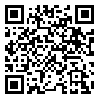Volume 17 - Supplement of 11th Annual Iranian Congress of Medical Ethics (Posters)
IJMEHM 2024, 17 - Supplement of 11th Annual Iranian Congress of Medical Ethics (Posters): 1-2 |
Back to browse issues page
Download citation:
BibTeX | RIS | EndNote | Medlars | ProCite | Reference Manager | RefWorks
Send citation to:



BibTeX | RIS | EndNote | Medlars | ProCite | Reference Manager | RefWorks
Send citation to:
Gaeeni M, Asayesh H, Parizad A, Abedini Z. Explaining Nursing Students’ Experiences of Professional Ethics in Relation to Psychiatric Clients: an Analysis Based on Narrative Writing-Reflection. IJMEHM 2024; 17 (S1) :1-2
URL: http://ijme.tums.ac.ir/article-1-6892-en.html
URL: http://ijme.tums.ac.ir/article-1-6892-en.html
1- Associated Professor of Nursing, Department of psychiatric Nursing,School of Nursing, Qom University of Medical Sciences, Qom, Iran
2- PhD Student in of Medical Ethics, Department of Philosophy and Health Ethics, Faculty of Health and Religion, Qom University of Medical Sciences, Qom, Iran
3- Assistant Professor of Medical Education, School of Nursing, Qom University of Medical Sciences, Qom, Iran
4- Associated Professor of Nursing, Department of pediatric Nursing, School of Nursing, Qom University of Medical Sciences, Qom, Iran
2- PhD Student in of Medical Ethics, Department of Philosophy and Health Ethics, Faculty of Health and Religion, Qom University of Medical Sciences, Qom, Iran
3- Assistant Professor of Medical Education, School of Nursing, Qom University of Medical Sciences, Qom, Iran
4- Associated Professor of Nursing, Department of pediatric Nursing, School of Nursing, Qom University of Medical Sciences, Qom, Iran
Abstract: (139 Views)
Clinical education constitutes the cornerstone of nursing education. Enhancing students' theoretical and practical knowledge within the psychiatric department is crucial for improving their attitudes, acceptance, and delivery of care. The outcomes of effective clinical learning encompass the development and refinement of professional competencies, including communication and professional ethics, the cultivation of critical thinking for clinical judgment and decision-making, the enhancement of ethical sensitivity, and the fostering of effective team and group performance. Recognizing the significance of these factors, this study aimed to "explain the experiences of nursing students based on narrative writing-reflection during their first encounter with psychiatric clients." This qualitative study was conducted during the psychiatric nursing internship at the Faculty of Nursing, Qom University of Medical Sciences, over two consecutive semesters. Purposive sampling was employed, and data were collected through 10 semi-structured individual interviews and 2 face-to-face and virtual focus groups (n=5 per group). Data collection continued until data saturation was reached. Data analysis was conducted using a qualitative content analysis approach with the assistance of MAXQDA20 software. The clinical experiences of students during their initial psychiatric nursing training course, as reflected in their narrative writing-reflections, revealed a primary theme: "encouraging ethical and spiritual communication in nursing." This overarching theme encompassed four sub-themes: "enhancing empathetic communication," "enhancing ethical sensitivity," "respecting the dignity of clients," and "listening to the voice of clients' feelings." The experiences gained through the reflective method within the clinical education setting, particularly in specialized clinical environments such as psychiatric wards and during initial encounters with clients in these departments, can provide valuable insights into students' attitudes and perspectives towards these clients and their families. These rich experiences can be effectively utilized to cultivate and strengthen communication and professional ethics among medical science students.
Keywords: Professional communication and ethics, Clinical education, Narrative writing-reflection, Nursing students
Type of Study: Ethics Congress |
Subject:
Congress of Ethics
Received: 2025/03/8 | Accepted: 2024/12/23 | Published: 2024/12/23
Received: 2025/03/8 | Accepted: 2024/12/23 | Published: 2024/12/23
| Rights and permissions | |
 |
This work is licensed under a Creative Commons Attribution-NonCommercial 4.0 International License. |





